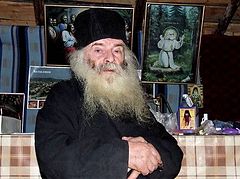Part 1: One doesn’t forge iron carelessly
Elsewhere St. Anthony said: “Be attentive, brethren, because on our relationship with our neighbor will it depend whether we will go to heaven, or whether we will go to hell.”
Everything depends on our relationship with our neighbor. Everything. You can’t say:
“I do a lot; I practice asceticism, pray, fast, etc., but other people don’t interest me! What do I have to do with them? What’s important is what I do together with God!
This is a mistake. I don’t get what it is that you do together with God. Have you ever seen God? So what are you doing together with God? You see your wife all day in front of you, and now also your friend, who happens to be sitting nearby and watching you listen to a radio show after you’ve just quarreled with him. Now you’re listening and thinking, “No big deal! My mind is now in the peaceful world of this radio broadcast!”
But that’s a mistake. You think that if you can press a button, and have another world open up before you, then you can say, “I don’t care about other people! I’ve got nothing to do with them!”? That’s wrong. Through others will it be decided whether we’ve succeeded spiritually or not. But now I’ll give you an exact quote: “Our life and our death is with our neighbor. If we gain our brother, we have gained God, but if we scandalize our brother, we have sinned against Christ.”
There are many women who love Christ. They’re married, have children etc., but forget about that. They always go to church, attend vigils, but regarding their husbands say:
“It’s no big deal that we quarrel! I mean, I’m calm when I’m here! As soon as I enter the church, I’m immediately calm!”
Yes, of course you become calm here, because you give in to your egotism and fulfill your own will here. But do you know what your husband would say now? He’d say, “My wife has gone to church, and instead of having Christ and the Church nourish her, so that she returns to me and the family a humbler, kinder and more normal person, she comes back and is more harsh and toxic than before.”
Quarrels, nervous tension, shouts, insults, slamming the door—you leave for vigil and at the entrance of the church say, “Here I forget about everything and am in Heaven!” I don’t agree. How can you be in Heaven when at this very same time such shouting and resentment is still lingering in your home? Is it possible for God to bless such things? To allow you to quarrel?
Look, I didn’t say that you should abandon your faith; I didn’t say that you should stop praying, or attending Divine Liturgy, but that you should, before becoming a supernatural person, a saint that has overcome everything earthly, at first just become normal. To reach the state that is above nature from this unnatural state of sin in which we abide, one must first go through the middle state, which is the normal state of being. One must first progress from the unnatural to the normal state, and only after that may one reach the state above nature and become holy. And so then others may see that when you’re near Christ, you become a normal person, that you have simplicity and do not turn into a strict teacher who corrects and judges everyone, who quarrels, despises family values and the family life.
Therefore don’t quarrel with others and say: “A-a-h, none of this matters! After all, I reconcile myself with God appropriately enough!” How is it that you reconcile yourself with God appropriately enough, when God Himself says to you, First go and reconcile with your brother, and then come to Me (cf. Mt. 5:24)?
***
Saint Anthony also talks about another thing. Suppose someone is living in the desert or some quiet place, i.e. you walk into your room, close the door and turn it into a cell for some time. You might say, “What? On the one hand, you talk about family, and on the other—about silence and a secluded room?” Well, yes, because your husband doesn’t sit at home all day. So you have the time to lead a quiet, spiritual life without getting distracted. You have that time. Isn’t that so?
Therefore, the saint says that when you live in silence, you’re freed from three types of warfare: the warfare that comes from hearing, speech and sight. You don’t hear any nonsense, senseless words, you don’t speak (i.e. you don’t talk idley), and you don’t look at anything. That’s first of all how one lives in a monastery. They don’t hear worldly things; they neither have a television, nor news, nor radio, but only quietude. Their sense of hearing relaxes, they don’t talk, and they say only the most necessary, few and meaningful words. They don’t judge, gossip—nothing. In the exact same way, they don’t look around at everything—if you stay in a monastery for about ten days, your sense of sight will be purified. Here in the city, what is it that we don’t see on TV, on the streets, in pavilions, on posters, in shop windows, and all around us? All of this defiles our soul, makes it grow lax, and one becomes “fragmented” because of this.
On the other hand, St. Anthony says, “When you’re in the desert, you only have one type of warfare: the battle with your heart within you”. If you close your mouth, eyes, ears, then inside of us begins a different kind of battle, which we as people living in the world do not perceive, because we haven’t come to the point of being able to perceive it. And then we start seeing our lusts, infirmities, passions, memories, and hereditary imperfections. All of these things make up a whole other world. Therefore, to be able to see your soul is an entire art. But to begin to see such things, says St. Anthony, you need to engage a little in silence, close your ears, mouth and eyes. This really helps us see what it is that we’re hiding inside of ourselves; however, it’s not an easy thing to do.
***
A hunter was once following a wild beast in the desert. He came across St. Anthony and thought that he would see him fully concentrated on prayer, that he would be quiet, serious, spiritual, and ascetical. How we expect such things from ascetics, and, thinking that they have achieved an unattainable state, say, “Wow, an ascetic! What’s he like? Does he have a body? Does he have flesh and bones? Or only angelic wings…? Does he eat anything?”
We sometimes view some people in our thoughts this way, but they, however, sometimes end up disappointing us. And I’ll tell you: It’s a good thing that they disappoint us, so that we might come down from heaven to earth; descend down from our fantasies, which—pay attention to what I’m going to say now—bring us to erroneous conclusions about them, and then we get tormented by this.
For example, some woman may think that an ascetic on Mt. Athos spends his entire day immersed in prayer and does nothing else besides this. And what’s the result of such thinking? You might say, “Is it truly bad for her to believe this?” To a certain extent, it’s okay. But there’s the danger of her forming a similar imaginary picture of the Christian life and then start seeing that her own life is not highly spiritual, because she doesn’t have enough strength for that, and then she’ll start experiencing guilt, become tormented and say: “Why am I not like that! Why can’t I also only have the desire to pray, but instead have a husband, kids, and all sorts of cares?” And she’ll begin suffering, giving herself unrest with these thoughts, because she created a myth, a fantasy, a dream that does not correspond with reality.
For this reason, when you go to the Holy Mt. Athos, some ascetics try to destroy such an overly high opinion about them. For two reasons: out of humility, in order not to stand out, but also because they want to bring you down from heaven to earth and say, “My man, just be natural, simple. You can’t be like a tin soldier that doesn’t smile or say anything”.
Is that not true? An ascetic, a saint, is also a real person; he also has moments where he’ll talk or become angry in a human way. And why, I don’t understand, wouldn’t he? Do saints never get angry? I’ve seen holy people that get angry, for example. On the Holy Mountain I’ve seen many humble fathers, but there may come certain moments when they would speak more strictly than usual.
But what does this mean? Why should you create some kind of imaginary picture, which ends up not being real? Faith is not аn area where we can create an idol inside ourselves, inside of our imagination, just because, “I like it this way, by imagining this”. Imagine what you wish, imagine that you’re not touching the ground with your feet when you walk. However right now I’m telling you what things are like in reality; and, in order to avoid excessive talk, I return to St. Anthony.
The hunter, who was looking for game in the desert, came to St. Anthony and saw him talking with his disciples, making jokes, laughing, and so said to him:
“Um, is that you? Father Anthony? Abba Anthony? You’re laughing? Talking?”
And St. Anthony said to him:
“Yes! It’s me. And in order to show you the reason for this, I’ll say the following: Take your bow. You’re a hunter, right? Take your arrow and load it! Good. Now pull at it!
So the hunter pulled the bowstring.
“Pull it a little more! A little more… A little more...”
“But, my father, I can’t pull it anymore! The bow will break!”
“Well, all right; don’t break it! So what have you understood now? Did you understand that if you pull the bowstring too hard it will break? So it is with our soul if we go to extremes—the same thing will happen with us then.”
We as people are capable of praying all day and all night, not eating anything for days, spending nights in prayer, standing on our feet without sleep; however, this doesn’t mean that even then we won’t have moments when we would relax, rest or tell a joke. If the desire for asceticism comes to you spontaneously, then that’s good; but if you do it by forcing yourself, being internally tense, then at some point that will bring you to a state of illness. You’ll exhaust yourself.
This is why St. Anthony instructed the hunter with such an example.
And this is why I told you that the Patericon does not give one any illusionary perceptions. For if you gain an illusionary perception of people, and then get to know them better and see that they’re still just people, you become disappointed. But who told you to become disappointed? You became disappointed because you were too enchanted by them. So don’t get enchanted in order not to become disappointed, but rather, have moderation and don’t be perturbed by anything, no matter what you may notice in other people during such moments of leisure.
All of this is written in the Patericon. The stories, I mean. But the comments are my own.
***
Once some people came to St. Anthony and said that so and so is a very good monk, that he’s a saint!
“Well, that’s wonderful!” said St. Anthony. “I want to see him, to see what kind of a person he is.”
And then, once the monk had come to St. Anthony, the latter began to test him. He would either scold him, or call him lazy or an egotist. Then the monk suddenly lost his temper and got angry, and St. Anthony said to himself: “So that’s how holy he is! It was enough to get him angry and say a couple of words, and there wasn’t a trace of his holiness left. Just because of a couple of remarks.”
So the saint came to him and said:
“Father, allow me to tell you something! You’re like a village in which the front-facing part of every house is decorated, the facades are magnificent, and the village seems perfect. To whomever sees it at first glance it seems to be exemplary. But thieves and robbers crawl into it through the back entrance and rob and devastate it. You have such an outer appearance, such a facade, that you seem magnificent; but now, it turns out that the passions are still alive in you, that you cannot bear any remarks and have not yet come to know humility.”
St. Anthony didn’t start scolding him, but simply brought him back down from heaven to earth:
“I’m not going to rebuke you, but do understand that it’s one thing what people say about you, and another thing who you really are in essence. Did you want to know the truth? This is the truth.”
The truth will be revealed when some discord between you and your brother happens, when someone hurts your selfishness, aggravates you a little, ruins your plans—then it’ll become evident whether or not you’ll show goodness and love in return. But when you’re praised, you will of course show all of your goodness, because then everyone else is good and holy, and you like that.
The real value of your way of life is revealed when one reviles you, humiliates, offends and rejects you and pours out their irritation on you. But if you love me and I love you back then of course it’s normal that we get along well with each other.
The whole matter lies in not having “thieves” be able to rob us of the treasure of our soul—holy humility, in which lies the secret of the spiritual life...





